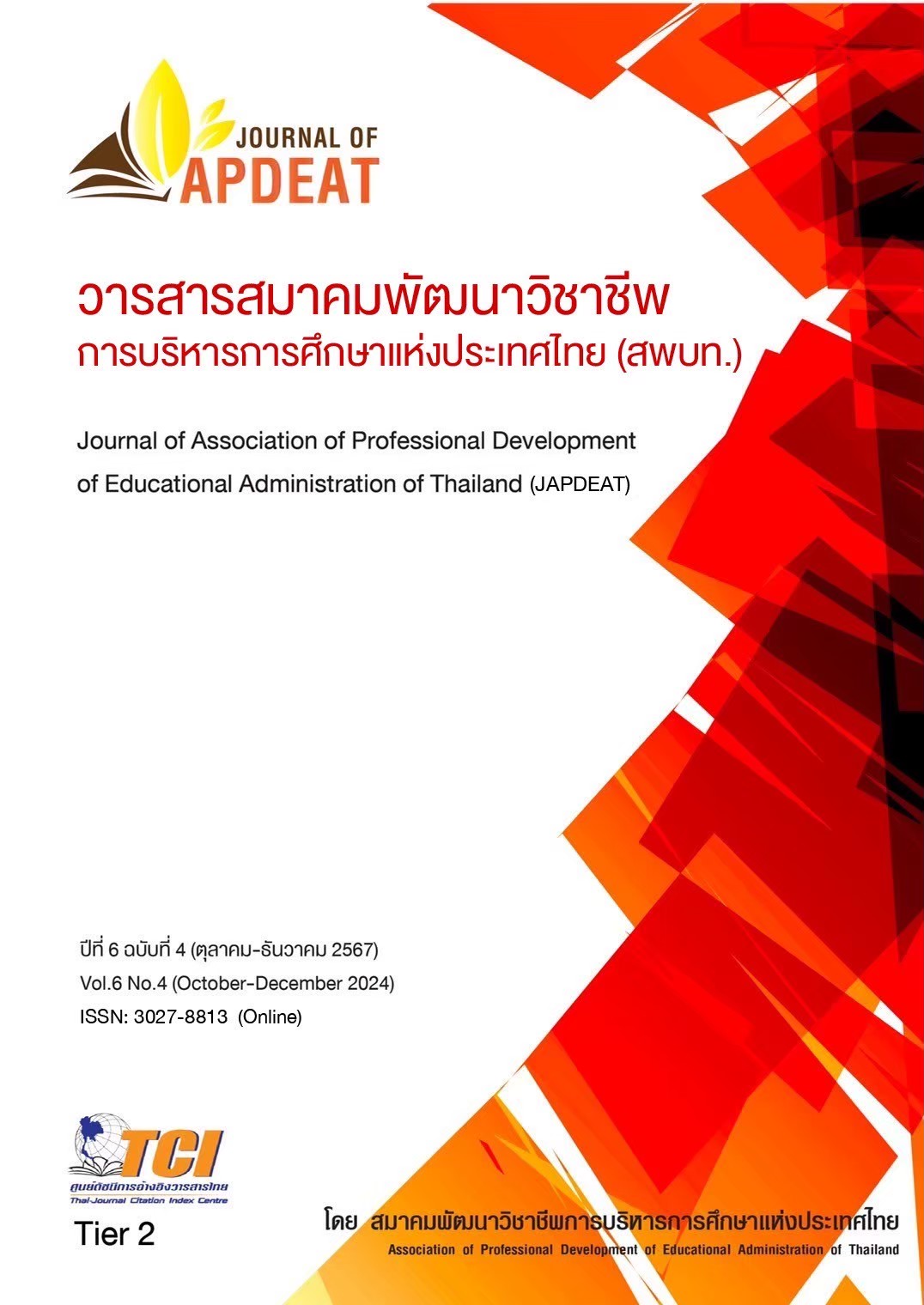ปัญญาประดิษฐ์เป็นเครื่องมือในการพัฒนาการจัดการเชิงกลยุทธ์ที่เสริมสร้างบรรยากาศที่เอื้อต่อการเรียนรู้: กรณีศึกษาที่ BTIS
Main Article Content
บทคัดย่อ
การวิจัยครั้งนี้มีวัตถุประสงค์เพื่อสำรวจการบูรณาการปัญญาประดิษฐ์ (AI) เข้ากับกระบวนการจัดการเชิงกลยุทธ์เพื่อเพิ่มบรรยากาศการเรียนรู้ภายในโรงเรียน การศึกษานี้มุ่งเน้นไปที่กรณีศึกษาที่ Britisih Thai International School at Chiangkham – Phayo (BTIS) โดยจะตรวจสอบการใช้งานการจัดการเชิงกลยุทธ์ที่ส่งเสริมสภาพแวดล้อมที่เอื้ออำนวยต่อการเรียนรู้ การวิจัยใช้วิธีการผสมผสานโดยใช้ข้อมูลทั้งเชิงปริมาณและเชิงคุณภาพจากแบบสอบถามและการสัมภาษณ์ผู้มีส่วนได้ส่วนเสียต่างๆ ดังนี้ นักเรียน 19 คน ครู 11 คน และผู้บริหาร 2 คน ผลการวิจัยพบว่า 1. AI ทำหน้าที่เป็นเครื่องมือที่มีประสิทธิภาพในการวิเคราะห์และกำหนดนโยบายการจัดการเชิงกลยุทธ์ที่เสริมสร้างบรรยากาศที่เอื้อต่อการเรียนรู้ 2. ความท้าทายและโอกาสที่อาจเกิดขึ้นที่เกี่ยวข้องกับการใช้ AI ในการจัดการเชิงกลยุทธ์เพื่อการศึกษา 3. การพัฒนากรอบการทำงานสำหรับผู้บริหารโรงเรียนเพื่อปรับปรุงบรรยากาศการเรียนรู้ ซึ่งจะช่วยสนับสนุนความเป็นอยู่ที่ดีและความพึงพอใจของชุมชนโรงเรียน สิ่งเหล่านี้มีส่วนทำให้เกิดองค์ความรู้ที่มีอยู่เกี่ยวกับบทบาทของ AI ในการจัดการเชิงกลยุทธ์ และผลกระทบต่อการสร้างสภาพแวดล้อมทางการศึกษา
Article Details
เอกสารอ้างอิง
Agrawal, A., Gans, J., & Goldfarb, A. (2017). What to expect from artificial intelligence. MIT Sloan Management Review, 58(3), 23-27.
Alai-Tafti, K. (2023). Responsible AI for education: A comprehensive review. Computers & Education, 215, 104799.
Brynjolfsson, E., & McAfee, A. (2016). The second machine age: Work, progress, and prosperity in a time of brilliant technologies. WW Norton & Company.
Brynjolfsson, E., & McAfee, A. (2014). The Second Machine Age: Work, progress, and prosperity in a time of brilliant technologies. W. W. Norton & Company.
Davenport, T. H., & Ronanki, R. (2018). Artificial intelligence for the real world. Harvard Business Review, 96(1), 108-116.
Faraj, S., Pachidi, S., & Sayegh, K. (2018). Working and organizing in the age of the learning algorithm. Information and Organization, 28(1), 62-70.
Hewlett, S. A., & Luce, C. B. (2020). Educating minds and hearts: A comprehensive guide to the leading Montessori principles. Sourcebooks, Inc.
Ferràs-Hernández, X. (2018). Artificial intelligence and strategic management: The rise of machine learning and its impact on business models. Journal of Business Models, 6(2), 15-21.
George, G., Haas, M. R., & Pentland, A. (2014). Big data and management. Academy of Management Journal, 57(2), 321-326.
Gunasekaran, A., Subramanian, N., & Papadopoulos, T. (2017). Information technology for competitive advantage within logistics and supply chains: A review. Transportation Research Part E: Logistics and Transportation Review, 99, 14-33.
Jovanovic, M., Gašević, D., & Dawson, S. (2016). AI-supported adaptive learning for the digital age. British Journal of Educational Technology, 47(2), 386-401.
Kaplan, A., & Haenlein, M. (2019). Siri, Siri, in my hand: Who’s the fairest in the land? On the interpretations, illustrations, and implications of artificial intelligence. Business Horizons, 62(1), 15-25.
Keding, C. (2020). Understanding the interplay of artificial intelligence and strategic management: four decades of research in review. Management Review Quarterly, 71, 91-134.
Lee, K. F. (2018). AI superpowers: China, Silicon Valley, and the new world order. Houghton Mifflin Harcourt.
Phan, T., Nguyen, T. T., Nguyen, P. T., & Nguyen, T. T. (2017). Artificial intelligence in e-learning. In International Conference on Advanced Learning Technologies and Technology-enhanced Learning. Springer, Cham.
Ruhe, M. (2019). Big data analytics in education: A systematic review and meta-analysis. Educational Research Review, 28, 44-55.


